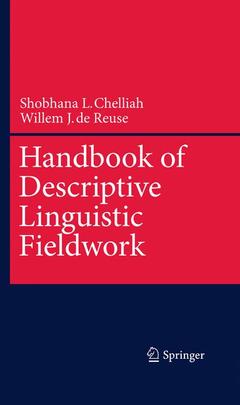Description
Handbook of Descriptive Linguistic Fieldwork, 2011
Authors: Chelliah Shobhana L., de Reuse Willem J.
Language: English
Subject for Handbook of Descriptive Linguistic Fieldwork:
Keywords
anthropology; archiving; bibliography; chelliah; colonialism; community; consultant; corpus; culture; data collection; data gathering; data management; descriptive; dictionary; discourse; documentation; elicitation; endangered language; ethnography; field methods; fieldwork ethics; fieldwork session; grammar; history; immersion fieldwork; interview fieldwork; intonation; language analysis; language data; language documentation; language preservation; lexical; lexicography; linguistic fieldwork; missionary; morphology; native speaker; participant-observer; philology; phonemic analysis; phonetic; phonology; pragmatics; questionnaire; recording; reuse; semantics; semi-speakers; shobhana; tone; typology; urban fieldwork; willem; word list
210.99 €
In Print (Delivery period: 15 days).
Add to cartPublication date: 09-2014
492 p. · 15.5x23.5 cm · Paperback
210.99 €
In Print (Delivery period: 15 days).
Add to cartPublication date: 10-2010
492 p. · 15.5x23.5 cm · Paperback
Description
/li>Contents
/li>Biography
/li>Comment
/li>
These books may interest you

Methodologies in Semantic Fieldwork 117.78 €



